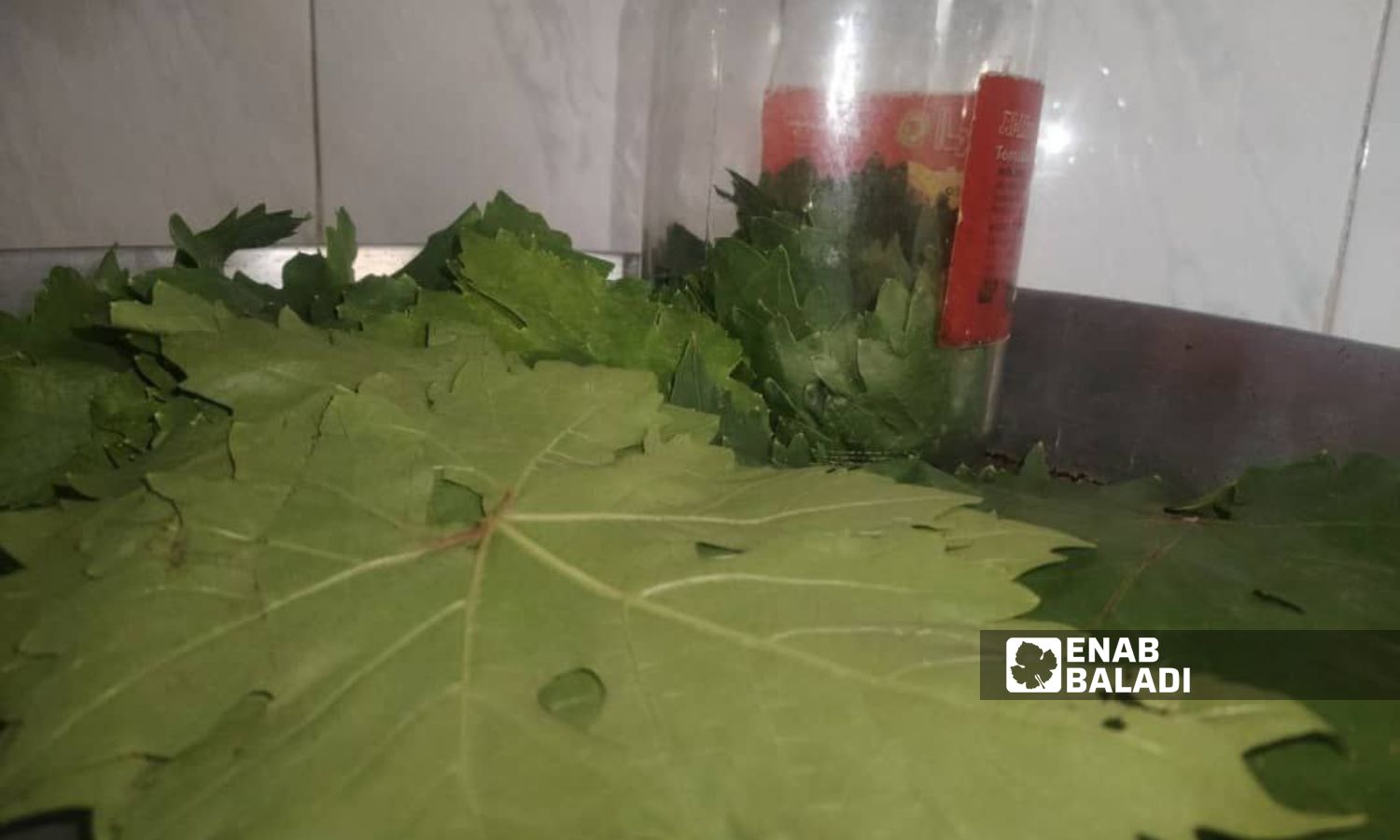



Latakia – Linda Ali
The rituals of preparing home preserves are absent from many families in Latakia province for several reasons, the most significant being the poor living conditions on one hand, and the absence of electricity and the inability to preserve food on the other, especially those requiring the process of freezing such as peas and green beans.
The price of a kilo of “yaprak” (grape leaves) did not drop below 18,000 Syrian pounds, although the season is almost over, which prompted Ghada (53 years old) to buy one kilo and preserve it by pickling for the upcoming winter.
Ghada, a public sector employee with a salary not exceeding 345,000 pounds, used to get at least five kilograms of grape leaves for free from her friends at work, who lived in rural areas and owned grape arbors.
The situation has changed for Ghada due to the current economic conditions, and her friends now sell the leaves instead of offering them as gifts, though they sell them at a price 3,000 pounds less than the market rate out of consideration for their colleagues.
Ghada used to keep various types of preserves from “yaprak” and beans to peas, tomatoes, pickles, and others. She now limits herself to cooking one batch of each type, having given up on stocking peas and beans due to the lack of electricity and her family not enjoying the taste of these items when dried, a method that involves leaving the pods until they dry out and become hard, then stored afterward.
Ghada does not buy peas for preserving due to their high price; instead, she buys them only to cook during their season. She mentioned that the price of a kilo of peas in pods ranges between 8,000 and 10,000 pounds, jumping to 30,000 pounds after shelling, and beans in pods between 6,000 and 8,000 pounds, reaching 25,000 for shelled beans – figures that are not insubstantial compared to the income and other life necessities.
Most families in Latakia are dropping the idea of home preserves, as prices are high whether during the vegetable seasons or in winter, with little difference. Only rural residents owning agricultural lands plant some crops to make preserves without needing to buy them.
Yasmin (26 years old), living with her husband in a village in the rural area of Jableh under Harf al-Masaytara district, preserved beans from her land by drying and the grape leaves using the methods of pickling in water and salt, pressing by vacuuming the air out of the jar and then sealing it to keep until next year.
As for other types, Yasmin mentioned she has given up on them, conditioning herself and her family to eat peas in their season, as their taste greatly changes if pickled or dried, unlike beans, which remain comparatively good.
Some ice cream factories in some rural areas distributed solar panels along with refrigerators to some grocery stores, ensuring they could sell their produce despite retail stores’ reluctance to buy ice cream, given the harsh electricity rationing.
Mohammed (a pseudonym), who owns a shop in one of the rural areas near Latakia city, mentioned his wife tried something new this year at the request of the neighbors. She bought quantities of peas and beans then sorted them in the refrigerator using the solar panels, intending to sell them to the neighbors during the upcoming winter season.
Mohammed refused to have his shop’s name or location mentioned or even hinted at, fearing the owner of the ice cream factory that provided him with the solar energy and fridge might demand them back.
Mohammed believes this idea is innovative and simplifies the task for neighbors, adding that the price for 400 grams of sorted peas sold in retail stores reaches 25,000 pounds, and he does not plan to sell 500 grams for more than 15,000 pounds, hoping the price stability continues as it is today.
Many lost their food preserves in 2020 and 2021 due to electricity rationing before they stopped freezing and sought new alternatives. However, these do not seem desirable to most, as freezing preserves the flavor of vegetables more than other methods.
The selling rate of one US dollar against the Syrian pound was 14,850 pounds according to the S-P Today, a website specialized in currency exchange rates.
The minimum salary in areas controlled by the Syrian regime is 279,000 Syrian pounds ($18.7).
The average living cost for a Syrian family of five has risen to about 12.5 million Syrian pounds, with a minimum of 7.8 million pounds.
On May 9, the World Food Programme (WFP) reported that the cost of basic goods continues to rise in Syria. However, income levels remain low, covering only 29% of total expenses.
In Syria, approximately 16.7 million people require humanitarian assistance, according to estimates by the United Nations High Commissioner for Refugees (UNHCR).
if you think the article contain wrong information or you have additional details Send Correction